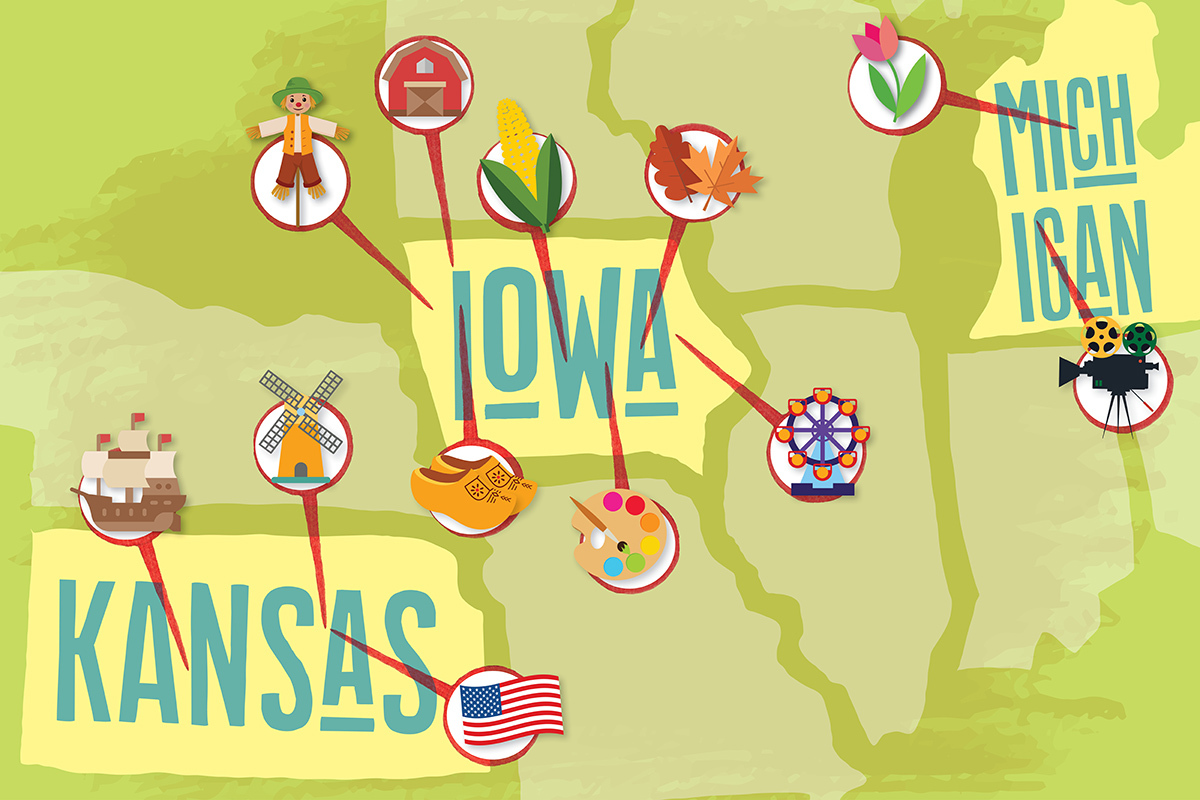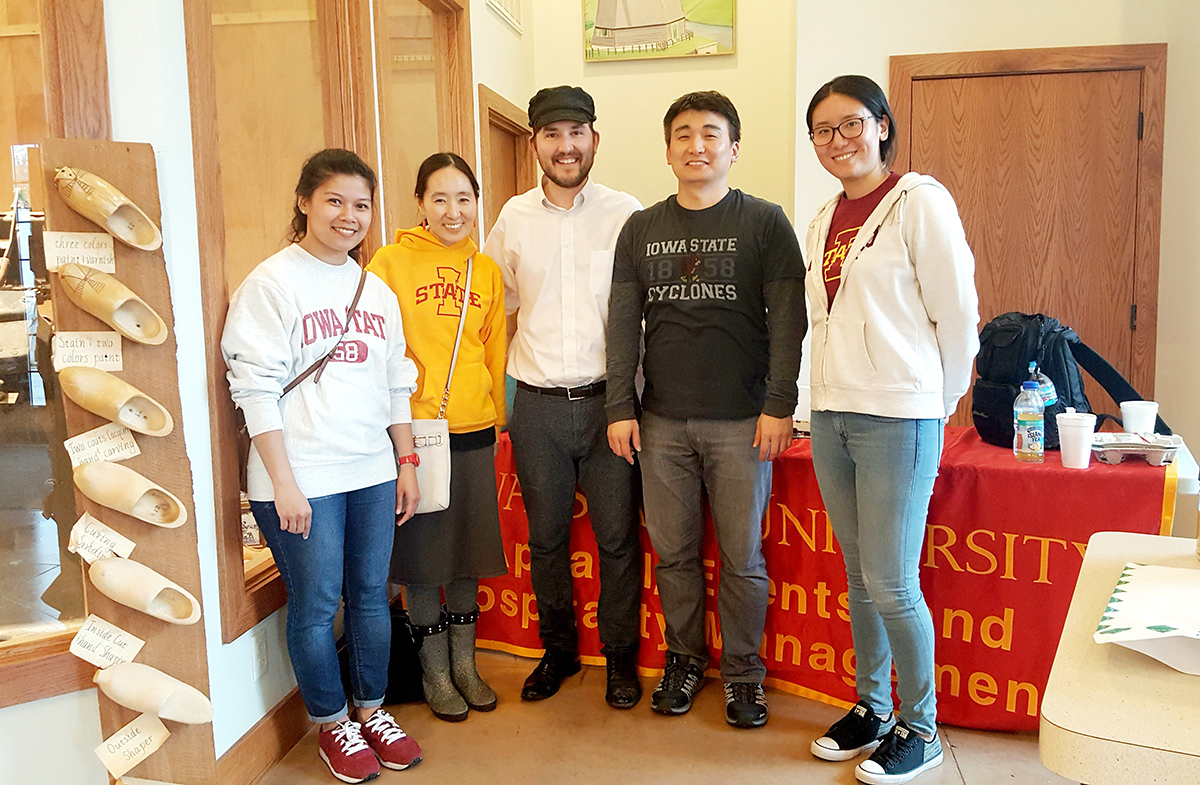
Researchers surveyed hundreds of volunteers from 12 festivals across Iowa, Michigan and Kansas for their study. Larger image. Graphic created by Deb Berger/Iowa State University.
AMES, Iowa — During Orange City’s three-day tulip festival each May, the northwest Iowa town attracts roughly 40,000 visitors, more than six times its population. People come for the blooms and parades, traditional Dutch food and musical theater. For the community, it’s an opportunity to celebrate its cultural heritage and give a boost to local businesses.
Volunteers are essential to the festival’s success, as they are for many rural celebrations across the Midwest. But not a lot of research has examined their motivations. To help fill this gap, researchers surveyed hundreds of volunteers from 12 festivals — including Orange City’s — across Iowa, Michigan and Kansas. All of the festivals were based in communities with 1,000 to 35,000 residents and centered on the arts, culture or film.
SoJung Lee led the study. The associate professor in Iowa State University’s Department of Apparel, Events and Hospitality Management researches rural and sustainable tourism, pop culture tourism and country clubs. She also directs graduate education for hospitality management and the Club Research Lab at Iowa State. Co-authors include Linda Niehm, professor and interim department chair of AESHM, whose expertise includes rural retailing and small family businesses; associate professor MiRan Kim at Michigan State University; and associate professor Jichul Jang at Kansas State University.

SoJung Lee, associate professor. Larger image. Photo by Christopher Gannon/Iowa State University.
“Festivals have become significant drivers of economic development that benefit rural communities, but they depend on volunteers who give up their time,” says Lee. “In this study, we wanted to better understand their motivations and focused on psychological ownership. How important is it for volunteers, and how does it affect community involvement and support?”
In their paper, the researchers break psychological ownership into four parts: self-efficacy, accountability, belongingness and self-identity. Self-efficacy relates to an individual’s confidence that they can make a difference. Accountability is the likelihood that someone would speak up if something wasn’t done correctly or if the event or organization was criticized. Belongingness refers to feeling included while self-identity is the idea that someone’s success or identity is connected to the event.
On-site and online survey results from 373 participants indicate people are more likely to volunteer and support community development if they have a strong sense of psychological ownership. This is bolstered when they perceive an event as personally important and relevant, feel needed and find social connection with other volunteers and attendees.
The researchers say tapping into these values can help attract and retain volunteers in the long run. They recommend reaching out to community members before planning a festival or event to gauge interest. Once in motion, festival planners and organizers should find ways to engage volunteers, perhaps by giving them opportunities to make decisions or take on leadership roles. Organizing social events for volunteers can help them build relationships and feel appreciated, as well.
In addition to analyzing motivations, the researchers looked at demographic data provided by the survey participants and how much they volunteered:
- 82% of the volunteers were local residents
- 75% were women
- 80% were over 40 years old; 58 was the average age
- 55% were employed; 40% were retired; 5% were unemployed or full-time students
- 53% volunteered between one to four hours per day at the festival; the rest volunteered five or more hours per day
- 45% of people volunteered at the festival between one and five years; 22% had volunteered between six and ten years; 33% had volunteered for 11 or more years
- More than 90% had some college or higher education degrees
- Average household income was $75,000
The researchers say the high percentage of women and average age align with other studies about rural volunteerism and community engagement.
In the paper, they emphasize their findings offer “practical implications [that] will be useful to not only festival organizers but also economic and community developers, Extension program specialists, business consultants, and others who provide support to rural towns and their residents.”
“As we visited these festivals, we could really see that they brought out a lot of community pride and economic support. Often, generations of families came back for these events. These festivals can add a lot to communities, including the optimism and mindset of the people who live there,” says Niehm.
“Volunteers are direct resources to communities. Taking care of them by providing enough breaks and food, being open to their input, showing appreciation and fostering social connections can have larger ripple effects on community development and growth,” adds Lee.
The co-authors say future research could explore trends by surveying volunteers at the same festivals over a long period of time. Different settings, urban vs. rural, and other factors, like the size of the event and cultural background, could be studied as well.
Funding for this study came from the North Central Regional Center for Rural Development.
Rural festivals that participated:
- Adel Sweet Corn Festival, IA
- Celebrate Freedom in Wamego, KS
- Clay County Fair, IA
- Columbus Day Festival, KS
- Great Akron Scarecrow Festival, IA
- Orange City Tulip Festival, IA
- Kalona Fall Festival, IA
- Marshalltown Art Festival, IA
- Mount Vernon-Lisbon Community, IA
- Traverses City Film Festival, MI
- Tulip Time Festival, MI
- Wamego Tulip Festival, KS

Associate professor SoJung Lee and former graduate students Zahidah Ab Latif, Heelye Park and Xingyi Zhang meet with an Orange County Tulip Festival organizer while conducting their study. Photo courtesy of SoJung Lee/Iowa State University.







